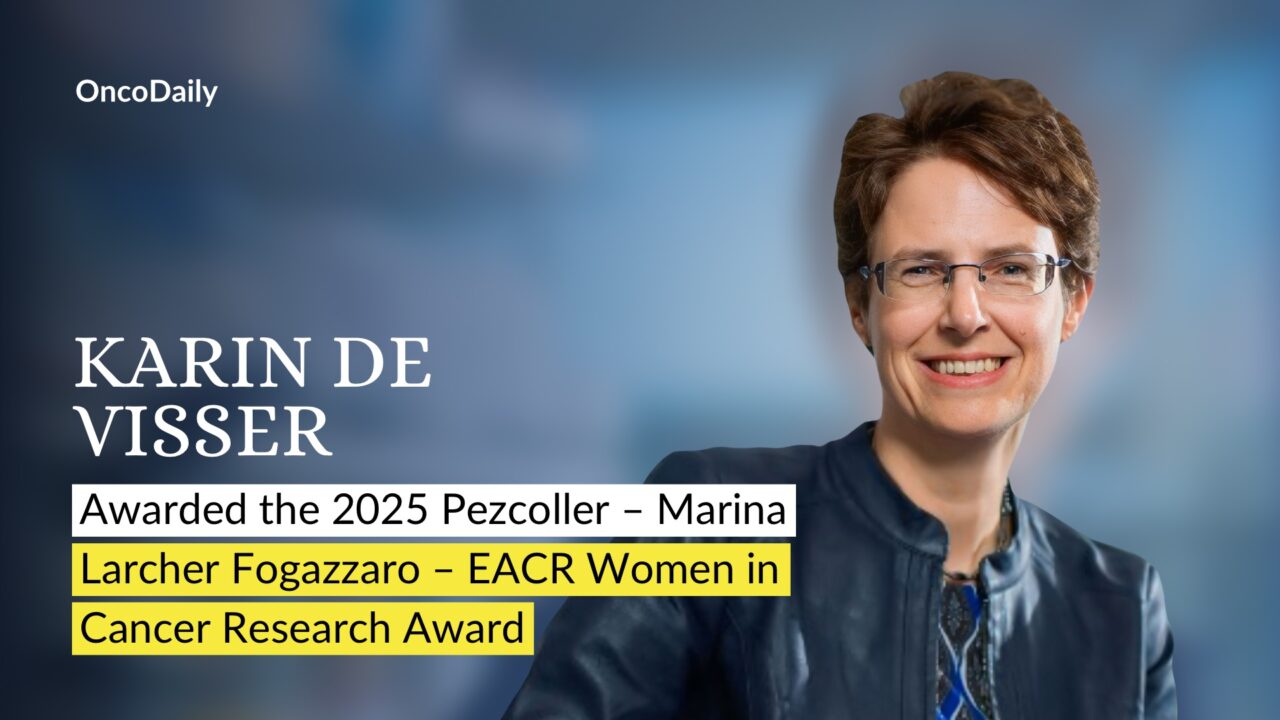Karin de Visser was awarded the 2025 Pezcoller – Marina Larcher Fogazzaro – EACR Women in Cancer Research Prize for Her Groundbreaking Work on Immune System’s Role in Breast Cancer Metastasis and Treatment Response.
Karin de Visser was nominated for this prestigious award in recognition of her dedication to mentoring and supporting the next generation of scientists. Through her leadership and strategic guidance, she has fostered the careers of numerous women in science while also working to build a more inclusive and equitable environment for all researchers. Her commitment to empowering others has had a lasting impact on the scientific community.
Professor Karin de Visser is a group leader at the Division of Tumor Biology and Immunology at the Netherlands Cancer Institute (NKI) in Amsterdam and the Oncode Institute. She is also a full professor of Experimental Immunobiology of Cancer at Leiden University Medical Center. Professor de Visser earned her PhD in 2002 at NKI, specializing in cancer immunotherapy—long before immunotherapy became a cornerstone of cancer treatment.
After completing her PhD, Professor de Visser undertook postdoctoral research at the University of California, San Francisco (UCSF) from 2003 to 2005 to expand her expertise into the field of inflammation and cancer. She returned to NKI in 2005, where she joined Professor Jos Jonkers’ lab to further develop her knowledge of conditional mouse models for breast cancer. In 2010, she established her own research group, where she has continued to make significant contributions to the understanding of immune system interactions in cancer, particularly in breast cancer metastasis and therapy response.
Professor Karin de Visser is internationally recognized for her pioneering research on the role of the immune system in breast cancer metastasis formation and therapy response. Her work has significantly advanced our understanding of how the tumor microenvironment, particularly tumor-induced systemic inflammation, influences cancer progression and treatment outcomes. One of her most impactful contributions has been her discovery of how tumor-induced inflammation drives neutrophil-dependent immunosuppression, which in turn promotes the formation of metastases. Her research has demonstrated that this process is critical for breast cancer metastasis and highlights the importance of targeting the immune system to prevent cancer spread.

In addition to her work on neutrophil-driven metastasis, Professor de Visser’s team has made groundbreaking strides in integrating cancer genetics with tumor immunology. They have shown how the genetic makeup of breast cancer shapes the immune landscape, influencing both the tumor’s ability to evade the immune system and its responsiveness to therapies. A particularly important collaboration with Dr. Marleen Kok has led to the discovery of the critical role that eosinophils play in the effectiveness of immunotherapy in breast cancer. This finding opens new avenues for improving immunotherapy responses and suggests potential biomarkers to predict patient outcomes.
Professor de Visser’s exceptional contributions to cancer research have earned her numerous prestigious awards and honors. These include an ERC Consolidator Grant in 2014, the Metastasis Research Prize from the Beug Foundation in 2015, and election as an EMBO Young Investigator in 2016. In recognition of her continued excellence in research, she became an EMBO member in 2021. Beyond her individual research achievements, she has also shown strong leadership in the scientific community. She served on the Research Management Committee of the Oncode Institute from 2018 to 2024, helping guide strategic research directions in cancer. Currently, she co-leads the Immunotherapy research theme at the Netherlands Cancer Institute (NKI), where she continues to push the boundaries of cancer immunology and therapy development.
Her work not only deepens our understanding of breast cancer but also has the potential to transform the way we treat metastatic cancer, making her a key figure in the global fight against cancer.
About Pezcoller Foundation
The Pezcoller Foundation is a non-profit institution dedicated to advancing scientific research in the fight against diseases that affect humanity, with a particular focus on cancer. Established in 1980 by Professor Alessio Pezcoller, who was the Chief Surgeon at Santa Chiara Hospital in Trento, Italy, the foundation aims to support and promote innovative cancer research and therapies.
The Foundation’s primary funding comes from a generous bequest left by Professor Pezcoller, along with significant contributions from key sponsors, including the Cassa di Risparmio di Trento e Rovereto Foundation, the Province of Trento, and the Administrative Councils of Trento and Rovereto, as well as occasional private donations. Over the years, the Pezcoller Foundation has gained increasing recognition within the global oncological community, forming collaborations with leading cancer research institutions, including the American Association for Cancer Research (AACR) and the European Association for Cancer Research (EACR). The Foundation’s Pezcoller Awards are formally presented at international conferences hosted by these two prestigious organizations, further cementing the Foundation’s important role in advancing cancer research and recognition of outstanding contributions to the field.
For more information, visit oncodaily.com.



